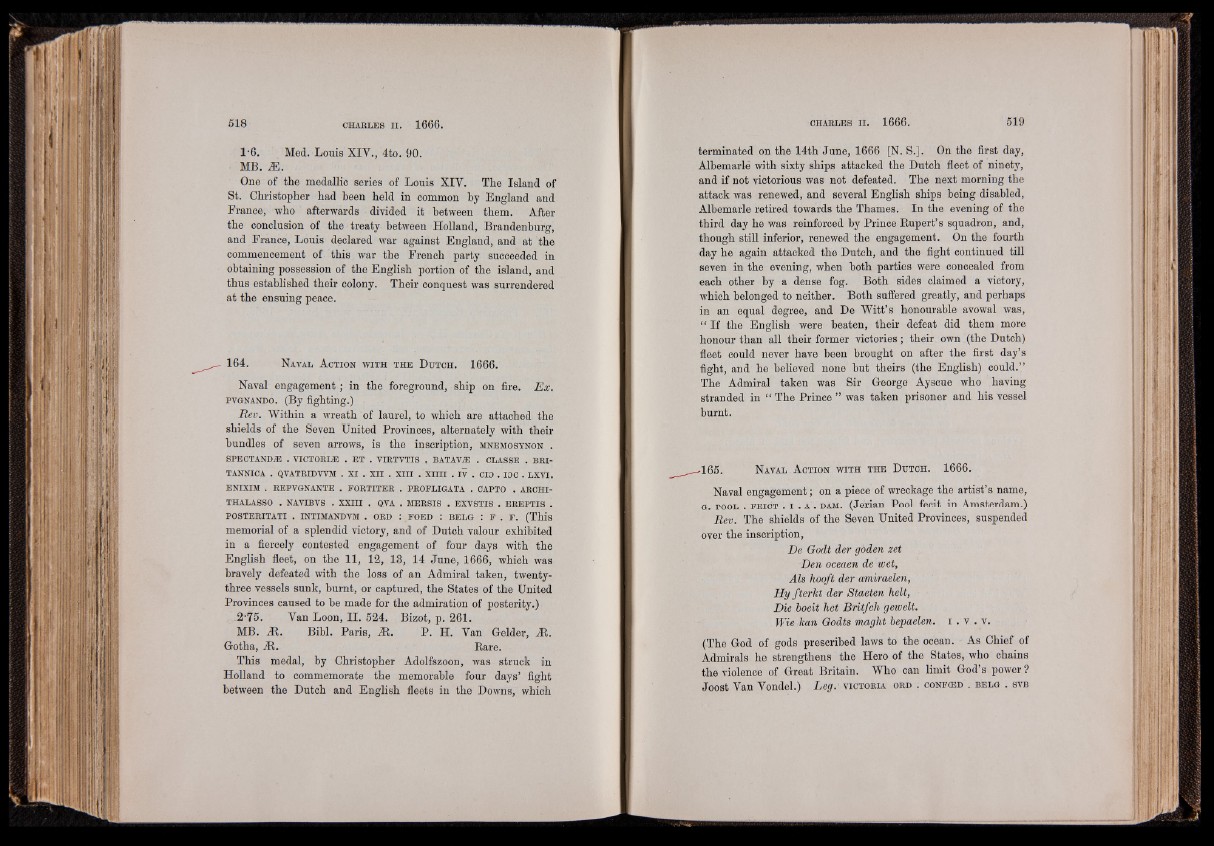
l -6. Med. Louis XIV., 4to. 90.
MB. Æ.
One of the medallic series of Louis XIV. The Island of
St. Christopher had been held in common by England and
France, who afterwards divided it between them. After
the conclusion of the treaty between Holland, Brandenburg,
and France, Louis declared war against England, and at the
commencement of this war the French party succeeded in
obtaining possession of the English portion of the island, and
thus established their colony. Their conquest was surrendered
at the ensuing peace.
164. Naval A ction with the D utch. 1666.
Naval e n g a g em e n t; in th e foreground, ship on fire. Ex.
pvgnando. (By fighting.)
Rev. Within a wreath of laurel, to which are attached the
shields of the Seven United Provinces, alternately with their
bundles of seven arrows, is the inscription, mnemosynon .
SPECTAND2E . VICTOREE . ET . VIRTVTIS , BATAVJE . CLASSE . BRI-
TANNICA . QVATRIDWM . XI . XII . XIII . XIIII .IV . CIO . IOC . LXVI.
ENIXIM . REPVGNANTE . PORTITER . PROFLIGATA . CAPTO . ARCHI-
THALASSO . NAVIBVS . XXIII . QVA . MERSIS . EXVSTIS . EREPTIS .
POSTERITATI . INTIMANDVM . ORD : FOED : BELG : F . F . (This
memorial of a splendid victory, and of Dutch valour exhibited
in a fiercely contested engagement of four days with the
English fleet, on the 11, 12, 13, 14 June, 1666, which was
bravely defeated with the loss of an Admiral taken, twenty-
three vessels sunk, burnt, or captured, the States of the United
Provinces caused to be made for the admiration of posterity.)
2'75. Van Loon, II. 524. Bizot, p. 261.
MB. At. Bibl. Paris, At. P. H. Van Gelder, At.
Gotha, At. Bare.
This medal, by Christopher Adolfszoon, was struck in
Holland to commemorate the memorable four days’ fight
between the Dutch and English fleets in the Downs, which
terminated on the 14th June, 1666 [N. S.], On the first day,
Albemarle with sixty ships attacked the Dutch fleet of ninety,
and if not victorious was not defeated. The next morning the
attack was renewed, and several English ships being disabled,
Albemarle retired towards the Thames. In the evening of the
third day he was reinforced by Prince Bupert’s squadron, and,
though still inferior, renewed the engagement. On the fourth
day he again attacked the Dutch, and the fight continued till
seven in the evening, when both parties were concealed from
each other by a dense fog. Both sides claimed a victory,
which belonged to neither. Both suffered greatly, and perhaps
in an equal degree, and De Witt’s honourable avowal was,
“ If the English were beaten, their defeat did them more
honour than all their former victories ; their own (the Dutch)
fleet could never have been brought on after the first day’s
fight, and he believed none but theirs (the English) could.”
The Admiral taken was Sir George Ayscue who having
stranded in “ The Prince ” was taken prisoner and his vessel
burnt.
165. Naval Action with the Dutch. 1666.
Naval engagement ; on a piece of wreckage the artist’s name,
G. pool . feict . i . a . dam. (Jerian Pool fecit in Amsterdam.)
Rev. The shields of the Seven United Provinces, suspended
over the inscription,
De Godt der goden zet
Den oceaen de wet,
Als hooft der amiraelen,
Hy fterkt der Staeten helt,
Die boeit het Britfch gewelt.
Wie kan Godts maght bepaelen. i . v . v.
(The God of gods prescribed laws to the ocean. As Chief of
Admirals he strengthens the Hero of the States, who chains
the violence of Great Britain. Who can limit God’s power ?
Joost Van Vondel.) Leg.' victoria ord . confoed . belg . svb